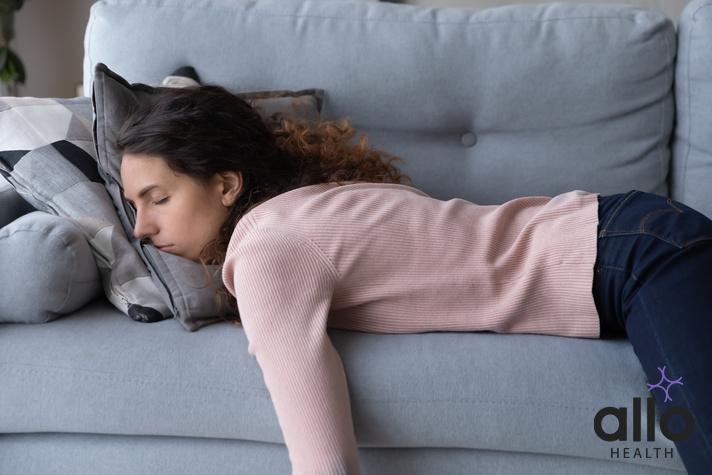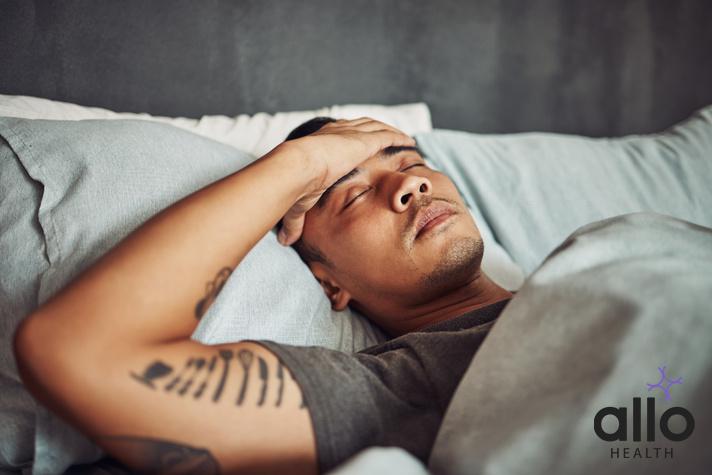Knowing All About Sleep Arousal Disorder

Allo Health is dedicated to personalized well-being, offering support and trusted information tailored to individual health goals. The platform emphasizes human-generated content, led by a distinguished medical team of experts, including physicians and sexual health specialists. Their commitment to credibility involves rigorous fact-checking, authoritative research, and continuous updates to ensure accurate, up-to-date information. Allo Health's unique approach goes beyond conventional platforms, providing expert-led insights and a continuous commitment to excellence, with user feedback playing a crucial role in shaping the platform's authoritative voice.

Dr. Aditi completed her undergraduate medical education at AJIMS, Mangalore, after which she worked in multi-speciality hospitals with COVID patients and in the Pain and Palliative medicine department. Driven by her experiences, she developed a keen interest in psychiatry. Dr. Aditi believes that mental health is just as, if not more important, than physical health.
Why This Was Upated?
Our experts continually monitor the health and wellness space, and we update our articles when new information became available.
Updated on 26 February, 2024
- Article was updated as part of our commitment to diversity, equity, and inclusion.

"The following blog article provides general information and insights on various topics. However, it is important to note that the information presented is not intended as professional advice in any specific field or area. The content of this blog is for general educational and informational purposes only.
Book consultation
The content should not be interpreted as endorsement, recommendation, or guarantee of any product, service, or information mentioned. Readers are solely responsible for the decisions and actions they take based on the information provided in this blog. It is essential to exercise individual judgment, critical thinking, and personal responsibility when applying or implementing any information or suggestions discussed in the blog."
Sleep is important for overall health and well-being, but many of us don’t get enough of it. For some, however, sleep is a much bigger concern than just feeling groggy in the morning. Sleep arousal disorder (SAD) is one such condition that can have a serious impact on a person’s quality of life. In this article, we’ll explore what SAD is, its causes, symptoms, diagnosis, and treatment options. Additionally, we’ll provide strategies for coping with the disorder and making lifestyle changes to improve overall sleep health.
What is Sleep Arousal Disorder?
- Sleep Arousal Disorder (SAD) is a sleep disorder characterized by incomplete awakenings during the night.
- Individuals with SAD may experience confusion, disorientation, or even engage in unusual behaviors during these partial awakenings.
- SAD can disrupt normal sleep patterns and lead to fragmented sleep, and arousal from sleep, causing fatigue and daytime sleepiness.
- Episodes or stages of sleep arousal may involve sitting up, talking, or even walking while still in a deep sleep state.
- Factors such as stress, sleep deprivation, and certain medications can contribute to the development of Sleep Arousal Disorder and eventually, may also cause sleep paralysis.
- Proper diagnosis often involves a sleep study to monitor and analyze nocturnal behaviors and the hours of sleep.
- Treatment options may include addressing underlying causes, improving sleep hygiene, the quality of human sleep, and in some cases, medication.
- Seeking professional help is crucial for those experiencing symptoms of Sleep Arousal Disorder to ensure proper management and improved sleep quality.
The Different Types of Sleep Arousal Disorder
- Sleep-Related Hypoactive Sexual Desire Disorder (HSDD):
- Characterized by a lack of interest in sexual activity during the sleep period.
- May result in decreased sexual thoughts, fantasies, and initiation of sexual activity.
- Sexual Arousal Disorder in Sleep (SASD):
- Involves sexual arousal during sleep without corresponding conscious awareness.
- Individuals may experience genital engorgement or lubrication during sleep.
- Sleep-Related Erections (SRE):
- Common in males, involving spontaneous erections during REM (rapid eye movement) sleep.
- Considered a normal physiological response but can be distressing in certain cases.
- Nocturnal Orgasm Disorder:
- More prevalent in females, characterized by orgasms during sleep without conscious stimulation.
- Often associated with vivid dreams or sexual fantasies.
- Sleep-Related Dissociative Disorder (SRDD):
- Involves dissociation between sleep and sexual behaviors, leading to unusual or inappropriate sexual activities during sleep.
- May result in distress and confusion upon awakening.
Understanding these sleep arousal disorders is crucial for proper diagnosis and management, ensuring individuals receive appropriate care for improved sleep and overall well-being.

Causes of Sleep Arousal Disorder: Genetics, Environment, and More
- Genetics: Inherited factors play a role, with a genetic predisposition potentially contributing to sleep arousal disorders.
- Environmental Triggers: Stress, trauma, or disruptive sleep environments can provoke episodes of sleep arousal.
- Medications: Certain drugs may interfere with normal sleep patterns, leading to arousal disturbances.
- Sleep Disorders: Conditions like insomnia or sleep apnea can be linked to sleep arousal disorders.
- Neurological Factors: Abnormalities in the brain’s arousal system may contribute to the disorder.
- Hormonal Changes: Fluctuations in hormones, especially in women, can influence sleep arousal patterns.
- Psychological Factors: Mental disorders like anxiety and depression may contribute to sleep disturbances.
- Substance Use: Alcohol, caffeine, or substance abuse can impact sleep, triggering arousal episodes.
- Restless Legs Syndrome: People with this condition may experience involuntary abnormal movements leading to arousal.
- Sleep Deprivation: Insufficient or poor-quality sleep can increase the likelihood of sleep arousal disorders.
Symptoms of Sleep Arousal Disorder: How to Identify It
- Fragmented Sleep: Sleep Arousal Disorder leads to frequent awakenings during the night.
- Confusion Upon Waking: Individuals may experience disorientation upon sudden arousal.
- Difficulty Resuming Sleep: Struggles to go back to sleep after waking up.
- Night Sweats and Anxiety: Physical symptoms like sweating and heightened anxiety during arousal.
- Sleepwalking or Night Terrors: Some may exhibit unusual behaviors during sleep disruptions.
- Impaired Daytime Function: Persistent tiredness and difficulty concentrating due to disrupted sleep.
- Impact on Relationships: Arousal disorder can affect both the individual and their partner’s sleep.
- Seek Professional Evaluation: Consult a healthcare professional if there are clinical history, and if the symptoms persist for proper diagnosis and treatment.
Diagnosis of Sleep Arousal Disorder: What to Expect from Your Doctor
- Comprehensive Evaluation: Your doctor will conduct a thorough assessment to understand your sleep patterns and symptoms.
- Medical History: Be prepared to discuss your medical history, including sleep habits, lifestyle, and any underlying health conditions.
- Sleep Study: A polysomnogram may be recommended to monitor your sleep stages, breathing, and movement disorders during the night.
- Physical Examination: A physical exam may be performed to identify any contributing factors or underlying health concerns affecting sleep arousal.
- Questionnaires: You may be asked to fill out questionnaires to provide additional insights into your sleep behaviors and overall well-being.
- Collaboration with Specialists: Your doctor may collaborate with sleep specialists or other healthcare professionals to ensure a comprehensive diagnosis.
- Follow-up Discussions: Regular follow-up appointments may be scheduled to monitor progress, adjust treatment plans, and address any concerns.
- Personalized Treatment Plan: Based on the diagnosis, a personalized treatment plan, which may include lifestyle changes, therapy, or medications, will be recommended.
- Patient Education: Expect your doctor to educate you on sleep arousal disorder, its implications, and the importance of adhering to the prescribed treatment for improved sleep quality.

The Impact of Sleep Arousal Disorder on Daily Life
- Sleep Arousal Disorder disrupts normal sleep patterns
- Frequent awakenings during the night
- Daytime fatigue and irritability
- Impaired concentration and memory
- Increased risk of accidents and decreased productivity
- Strain on relationships due to disrupted sleep
- Importance of seeking professional help for diagnosis and management.
Coping Strategies for Living with Sleep Arousal Disorder
- Establish a Consistent Sleep Schedule: Maintain regular sleep and wake times to regulate your body’s internal clock.
- Create a Relaxing Bedtime Routine: Develop calming rituals before sleep, such as reading or gentle stretching.
- Limit Stimulants Before Bed: Avoid caffeine and electronic devices close to bedtime to promote relaxation.
- Optimize Sleep Environment: Ensure a comfortable, dark, and quiet bedroom for quality rest.
- Explore Relaxation Techniques: Practice deep breathing, meditation, or progressive muscle relaxation to ease tension.
- Consult a Sleep Specialist: Seek professional guidance to understand and address specific aspects of sleep arousal disorder.
- Consider Cognitive Behavioral Therapy (CBT): Engage in therapy to address underlying concerns contributing to sleep disturbances.
- Implement Sleep Hygiene Practices: Foster good sleep habits, including limiting naps and avoiding heavy meals before bedtime.
- Evaluate Medication Options: Consult with a healthcare provider to explore pharmacological interventions if necessary.
- Stay Active During the Day: Regular exercise promotes better sleep, but avoid vigorous activities close to bedtime.
- Mindful Stress Management: Develop coping mechanisms for stress through mindfulness or relaxation techniques.
Remember, individual responses vary, and personalized strategies are essential for effectively managing sleep arousal disorder.
Treatment Options for Sleep Arousal Disorder: Medications, Therapy, and More
- Explore medications: Learn about pharmaceutical options to manage sleep arousal disorder.
- Consider therapy: Discover how counseling and behavioral therapies can address underlying causes.
- Lifestyle changes: Implement healthy habits for better sleep hygiene and overall well-being.
- Relaxation techniques: Explore methods like meditation and deep breathing to alleviate arousal concerns.
- Consultation with specialists: Seek guidance from sleep experts for a personalized treatment plan.
- Holistic approaches: Explore complementary therapies, such as acupuncture or herbal remedies.
- Sleep environment adjustments: Make changes to create a conducive atmosphere for restful sleep.
- Continuous monitoring: Regularly assess progress and adjust treatment strategies accordingly.
Natural Remedies for Managing Sleep Arousal Disorder Symptoms
- Explore natural remedies for Sleep Arousal Disorder Symptoms
- Lavender essential oil: Calming aroma promotes relaxation
- Valerian root: Herbal supplement aids in sleep regulation
- Chamomile tea: Soothes nerves and induces calm
- Magnesium-rich foods: Almonds and bananas help muscle relaxation
- Relaxation techniques: Deep/ rapid breathing, and meditation for stress reduction
- Maintain a consistent sleep schedule: Regulate circadian rhythm
- Limit screen time before bed: Reduce exposure to blue light
- Create a comfortable sleep environment: Dark, quiet, and cool surroundings promote better rest.
Preventing Sleep Disturbances: Tips to Reduce the Risk of Developing a Sleep Disorder
- Maintain a consistent sleep schedule
- Create a relaxing bedtime routine
- Limit screen time before bed
- Keep your bedroom dark and quiet
- Avoid caffeine and heavy meals close to bedtime
- Engage in regular exercise
- Manage stress through relaxation techniques
- Invest in a comfortable mattress and pillows
- Consult a healthcare professional if sleep concerns persist.
The Link Between Stress and Sleep Disorders
- Stress disrupts sleep patterns and causes frequent awakening from sleep.
- Increased cortisol levels affect sleep quality, and may cause daytime sleepiness due to tiredness.
- Anxiety and racing thoughts contribute to insomnia.
- Chronic stress linked to sleep disorders like insomnia, sleep-related seizures, or sleep apnea.
- Establishing stress management techniques crucial for improving sleep.
- Consistent sleep hygiene aids in stress reduction
- Mindfulness practices and relaxation techniques promote a better sleep cycle.
- Seeking professional help for other family history, chronic stress, and unusual behaviors during sleep is advisable.
How Lifestyle Changes Can Improve Your Quality of Sleep
- Consistent Sleep Schedule: Establish a regular bedtime and wake-up time, even on weekends, to regulate your body’s internal clock.
- Create a Relaxing Bedtime Routine: Engage in calming activities before bed, such as reading or taking a warm bath, to signal to your body that it’s time to wind down.
- Mindful Eating Habits: Avoid heavy meals close to bedtime and limit caffeine and alcohol intake, as they can disrupt sleep patterns.
- Optimize Your Sleep Environment: Keep your bedroom cool, dark, and quiet. Invest in a comfortable mattress and pillows for optimal support.
- Limit Screen Time Before Bed: Reduce exposure to screens (phones, computers, TVs) at least an hour before bedtime to minimize the impact of blue light on melatonin production.
- Regular Exercise: Incorporate physical activity into your routine, but avoid intense workouts close to bedtime.
- Manage Stress: Practice relaxation techniques such as deep breathing (taking deep breaths and breathing pauses), meditation, or yoga to alleviate stress and promote a calm state of mind.
- Evaluate and Upgrade Sleep Gear: Ensure your pillows and mattress are in good condition, replacing them as needed to support a restful night’s sleep.
- Seek Natural Light Exposure: Spend time outdoors during the day to regulate your circadian rhythm and improve overall sleep-wake patterns.
- Consult with a Healthcare Professional: If sleep concerns persist, consult a healthcare professional to rule out underlying conditions and explore potential solutions. Consultation and treatment of sleep apnea is also import
The Importance of Seeking Help if You Suspect a Sleep Disorder
- Recognizing signs: Identify persistent fatigue, difficulty concentrating, and disrupted sleep patterns.
- Health impact: Untreated sleep disorders can lead to serious health conditions like heart disease and obesity.
- Quality of life: Seeking help improves overall well-being, mood, and daily functioning.
- Professional evaluation: Consult a sleep specialist for a proper diagnosis and personalized treatment plan.
- Treatment options: Explore therapies, lifestyle changes, and, if necessary, medications tailored to address specific sleep disorders.
- Better sleep, better life: Addressing sleep disorders positively impacts mental activity, and physical health, enhancing overall quality of life.
Expert Advice on Living with and Managing a Chronic Sleep Condition
- Learn from sleep experts on managing chronic sleep conditions
- Explore practical tips for improving sleep quality
- Understand the impact of lifestyle changes on sleep disorders
- Discover personalized strategies for coping with sleep challenges
- Gain insights into the latest advancements in sleep disorder management.
Most Asked Questions
-
What is Sleep Arousal Disorder?
Sleep Arousal Disorder involves recurrent episodes of incomplete awakening, leading to disrupted sleep patterns.
-
What are the Common Symptoms?
Symptoms include sudden awakenings, confusion, and difficulty returning to sleep, often accompanied by anxiety.
-
What Causes Sleep Arousal Disorder?
Causes range from stress to medical conditions. Alcohol and certain medications can also contribute to this disorder.
-
How is it Diagnosed?
Diagnosis involves a thorough sleep evaluation, including a sleep study (polysomnography) to monitor nighttime behaviors.
-
What Treatment Options Are Available?
Treatment may include addressing underlying causes, cognitive-behavioral therapy, and lifestyle adjustments to promote better sleep hygiene. Consultation with a sleep specialist is recommended.






































